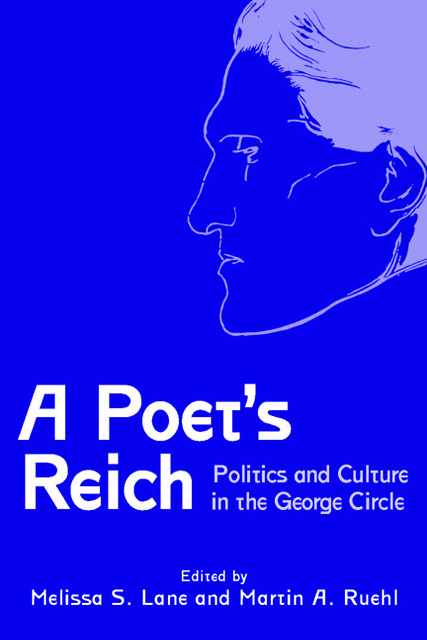9 - “Imperium transcendat hominem”: Reich and Rulership in Ernst Kantorowicz’s Kaiser Friedrich der Zweite
Published online by Cambridge University Press: 10 February 2023
Summary
Ernst Kantorowicz (1895–1963), though only a junior member of the George Circle in the 1920s, is now generally considered one of its preeminent figures. He is the subject of three biographies, numerous articles, and the secret hero of Ulrich Raulff’s recent study on George’s afterlife. The cumulative effect of these publications could be described as hagiographical. Kantorowicz, a former Freikorps soldier and an outspoken critic of the democratic and cosmopolitan features of the Weimar Republic, is celebrated as an “arch-liberal” and a “modern humanist,” who bravely defended the “Weimarian principles of tolerance and safeguarding human dignity” after the Nazi takeover, before emigrating to the United States in 1938. A curious side-effect of this hagiographical turn has been the revaluation of his 1927 biography of the Hohenstaufen emperor Frederick II. Once decried as “proto-fascistic” mythagoguery and hero-worship, Kaiser Friedrich der Zweite is beginning to be seen in a more favorable light: a methodologically innovative study, boldly at odds with the positivist tradition of German historiography at the time, and now a “standard work” of medieval scholarship. For the large majority of critics today there are no affinities between the politics of Kaiser Friedrich and Nazism. They claim that the rulers of the Third Reich merely “perverted” Kantorowicz’s elitism and his paean to the “heroic leader”; that the nationalist strain of his book was “far removed” from the biological racism of National Socialism and ultimately compatible with a “benevolent universalism,” and that Kantorowicz, drawing on Dante, conceived of Frederick as an emperor of iustitia and emphasized the “enlightened” features of his rule.
This seems to be the new critical consensus, as the Kantorowicz renaissance continues and increasingly obscures the more problematic aspects of his early work. The more Kaiser Friedrich is acclaimed as a seminal historiographical study, it appears, the more its reactionary political dimension sinks into oblivion. Even Robert Norton, otherwise highly alert to the ways in which the ideas of the George Circle paved the way for the coming of the Third Reich, offers no serious examination of the relationship between the messianism of the Hohenstaufen biography and National Socialism. Norman Cantor’s exaggerated claims about Kantorowicz’s “impeccable Nazi credentials” barely do justice to the complexity of this relationship, but neither do the hagiographers’ celebration of his allegedly resolute antifascist stance in 1933.
- Type
- Chapter
- Information
- A Poet's ReichPolitics and Culture in the George Circle, pp. 204 - 248Publisher: Boydell & BrewerPrint publication year: 2011

